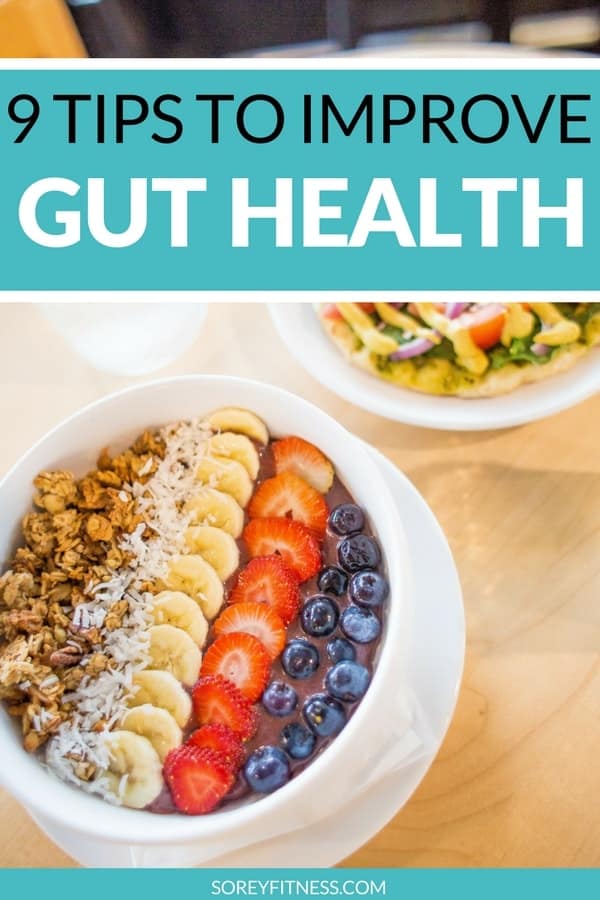Improve Gut Health – Best Foods, Prebiotics & Probiotics to Be Your Best
This post may contain affiliate links. All opinions shared are my own. As an Amazon Associate I earn from qualifying purchases. Click to view our full disclosure.
All content is created by humans – not AI.
It seems like everyone is looking to improve their gut health these days. We’ll outline what gut health means, as well as, 9 tips to help you feel better. We’ll also provide you with what has helped us restore our own gut health!

Consider us your fit girlfriends and that we’re chatting over tea. We’re not doctors, and this shouldn’t be taken as medical advice.
What is Gut Health?
Gut health refers to balance of good bacteria in our digestive tract. Prebiotics, Probiotics and digestive enzymes can help promote good bacteria and weaken bad bacteria in our bellies. In contrast, antibiotics, processed foods and sugar can promote bad bacteria to grow. Improving our gut health can be linked to everything from digestive to brain health based on studies we’ll look at below.
What are symptoms of an unhealthy gut?
Reader’s Digest interviewed Lisa Fischer, MS, RDN, LDN about the symptoms of an unhealthy gut. We used this article as well as this recent study for our symptoms.
Unhealthy Gut Symptoms included:
- Diarrhea, constipation, bloating, nausea, and heartburn
- Cravings
- Anxious or Sad Feelings
- Not being able to sleep well
- Irritated skin (eczema, rosacea, etc)
- Autoimmune problems
- hormonal imbalances
- changes in mood
- diabetes
- chronic fatigue
- fibromyalgia
- anxiety
- depression
- poor memory
9 Tips Improve Your Gut Health
We used same article mentioned above, as well as, Dr. Amy Myers’ research for our tips.
- Consider an Elimination Diet to see what triggers your symptoms
- Reduce your eating of processed foods like breads and pastas.
- Skip common irritants like alcohol, caffeine, and drugs.
- Avoid inflammatory foods like dairy, corn, eggs, and sugar.
- Eat more plants, fruits, seeds & nuts (like clean eating)
- Add in more fermented foods full of probiotics (see a list here)
- Enjoy prebiotic foods as well (view a list of prebiotic foods)
- Eat more fiber from whole sources like berries, beans, and whole grains.
- Consider adding in digestive enzymes as well (we love this shake which has both enzymes and probiotcs!)
Our Favorite Gut Health Books
Each are linked to Amazon, and we are affiliates for them.
- Wheat Belly: Lose the Wheat, Lose the Weight, and Find Your Path Back to Health by William Davis MD
- Dr. Davis also has a 10 Day Grain Detox if you’re looking purely for a plan vs research
- It Starts with Food — this one is more of an elimination diet versus gut health, but it truly worked for us. We love the Whole 30.

What We’ve Found Helps Our Gut Health
Along with the 9 tips above, we do add in collagen and digestive ezymes to our diet.
The whole term leaky gut comes from the idea that bacteria isn’t sticking to the walls of our insides like it should.
Collagen can help this along with improving your skin, hair and joint health. It’s also super easy to implement into your routine.
We personally love bone broth or Vital Protein’s Collagen Peptides, and we’ve reviewed the both in detail.
We also use Shakeology as a way to get in additional probiotics and digestive enzymes.
We did a full review of how it helped my IBS-C and mom’s UC here.
You may also like our posts on:




